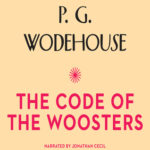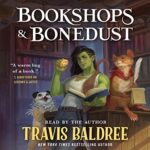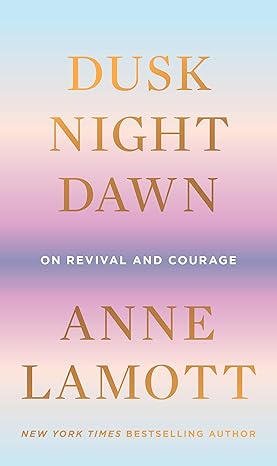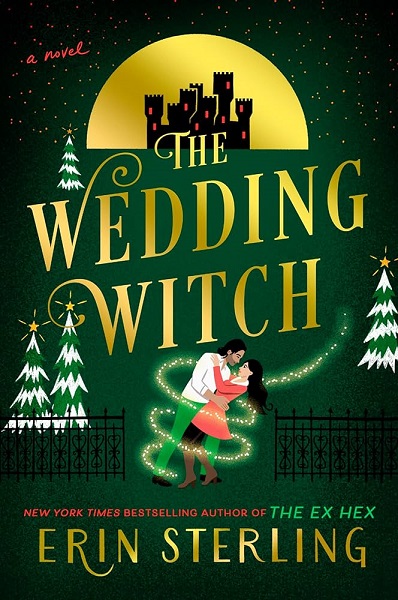Years ago, the only “books on tape” were produced for the visually-impaired. Then someone got figured out that there might be a market for audio recordings of books, and the audiobook was born. Audiobooks have been gaining in popularity over the last decade or so, in part because of the transition to CD format and then mp3. People seem to particularly enjoy listening to them in the car (they’re great for commuting or long road trips), but they’re also useful for anyone who wants to listen to a book while doing something else — housework, for instance, or handcrafts. Folding laundry and washing dishes go a lot faster when you’re engrossed in a story.
Our family has come to really love audiobooks. I admit that I was dubious at first. For one thing, I read a lot faster than I can listen, so I thought I would find audiobooks irritatingly slow. In fact, I don’t; it’s more like going to a play or listening to a lecture. A good reader can make a book come alive, not in the same way that I do when I’m reading, but satisfyingly nonetheless.
I would say that it was Jim Dale’s readings of the Harry Potter novels which first got us started when our daughter was young, but in fact, I had one or two “audiobooks” myself as a child. I still own my much-treasured vinyl recording of Maurice Evans reading the first chapter of Winnie the Pooh. We recorded it onto CD when our daughter was little, and she listened to it almost every night for months. She can still quote about 2 pages of the beginning of the first chapter. Verbatim. In an English accent.
Now, our nearly-grown daughter listens to classics, history, science, fantasy, and mystery — sometimes for homeschool assignments but more often by choice. We listen to books on the way to and from her community-college course and her violin lesson. My husband listens to fantasy or nonfiction books like Endurance on his commute to work. I listen to old favorites, new nonfiction, and anything else that captures my interest while doing housework or in rare moments when I sit down to knit.
But listening to audiobooks can get expensive. A typical novel or nonfiction work on CD can cost as much or more than a hardcover — sometimes quite a bit more. Patrick Rothfuss’s The Name of the Wind is currently $16.99 in hardcover at Amazon; the audiobook on CD — in mp3 format to fit on fewer disks — costs $21.89. Tolkien’s The Fellowship of the Ring on CD, read (very well) by Rob Inglis, costs over $30. I don’t know about you, but I’m having a hard enough time supporting my print and e-book habit. I don’t have a lot to spare for audiobooks, but I enjoy them for the all reasons listed above. (Did I mention housework, never my favorite of tasks?) So how to indulge in an audiobook without breaking the bank?
If you’re at all into e-books, by now you’re no doubt aware that many public-domain works are widely available for free. In the United States, most books published before 1923 are in the public domain. As it turns out, the same applies to audiobooks… with some caveats.
 Librivox offers a large number of titles in the public domain, from children’s books to literary classics. Volunteers read chapters of works, so while some Librivox titles are read by a single reader, others change readers from one chapter to the next, which can be a bit disconcerting to the listener. There is also no prescreening of readers, so the reading quality can vary. As far as I can tell, most of the readers are from the US or Canada, which can also be disconcerting when listening to, a book set in England. However, I have come across some readers whose accents indicate other origins. Still, most readers seem to do reasonably well, at least in terms of clarity, and some are quite good. If you’re interested in becoming a reader, this is a good place to start, but be forewarned that your favorite titles have probably already been read.
Librivox offers a large number of titles in the public domain, from children’s books to literary classics. Volunteers read chapters of works, so while some Librivox titles are read by a single reader, others change readers from one chapter to the next, which can be a bit disconcerting to the listener. There is also no prescreening of readers, so the reading quality can vary. As far as I can tell, most of the readers are from the US or Canada, which can also be disconcerting when listening to, a book set in England. However, I have come across some readers whose accents indicate other origins. Still, most readers seem to do reasonably well, at least in terms of clarity, and some are quite good. If you’re interested in becoming a reader, this is a good place to start, but be forewarned that your favorite titles have probably already been read.
Books Should Be Free also offers a wide selection of public-domain titles. So far, all the titles I’ve checked seem to be Librivox recordings, and thus suffer from the same problems. They may well carry books that Librivox doesn’t, so if you’re looking for an obscure title, it’s worth trying both sites.
For works currently under copyright, or for higher-quality readings of classics in the public domain, you’ll have to turn to recordings made by professionals, and that generally means paying for them, one way or another.
 Audible usually offers at least one free audiobook when you sign up. Audible is a subscription audiobook service; you pay a monthly fee and are issued one or credits per month entitling you to a free audiobook download. (Some longer books are worth more than one credit.) In addition, you are eligible for the member price on any additional books, which can be quite a bit less than ordering the book on CD. Strictly speaking, therefore, the Audible books aren’t really free; you pay for them, but you do pay less than you might at, for instance, Amazon. (You’re not, of course, getting a CD; you’re getting an mp3 download, which in part accounts for the cost differential.)
Audible usually offers at least one free audiobook when you sign up. Audible is a subscription audiobook service; you pay a monthly fee and are issued one or credits per month entitling you to a free audiobook download. (Some longer books are worth more than one credit.) In addition, you are eligible for the member price on any additional books, which can be quite a bit less than ordering the book on CD. Strictly speaking, therefore, the Audible books aren’t really free; you pay for them, but you do pay less than you might at, for instance, Amazon. (You’re not, of course, getting a CD; you’re getting an mp3 download, which in part accounts for the cost differential.)
Last but decidedly not least, try your local library. Here, you’re paying for audiobooks indirectly, via your tax dollars. Libraries these days have impressive collections of audiobooks; the audiobook section in my public library has at least doubled in size in the last 5 years. While they still have some books on cassette*, most of their titles are now available on CD, and believe me, our family has taken full advantage! I find the professionally-recorded versions of classics are usually of higher quality than the freebie versions at Librivox, so the library is the first place I check for public-domain works. I’ve also had some success in borrowing audiobooks not owned by my library through interlibrary loan.
None of this is to say that our family has stopped reading — quite the contrary! I still read voraciously, as does our daughter. My husband, less of a reader-for-pleasure, does most of his factual reading online these days, rather than in magazines and newspapers as he used to. In other words, audiobooks haven’t really changed our reading habits. Instead, they’ve increased the time we spend with books by giving us a way to “read” when our eyes or hands are busy doing something else.
Do you listen to audiobooks? What do you like or dislike about them? Do you know of any good sources for free or low-cost audiobooks that I haven’t mentioned?
* Audio cassettes are hard to listen to for technical reasons; I think we only have one audio cassette player left in the house.








































